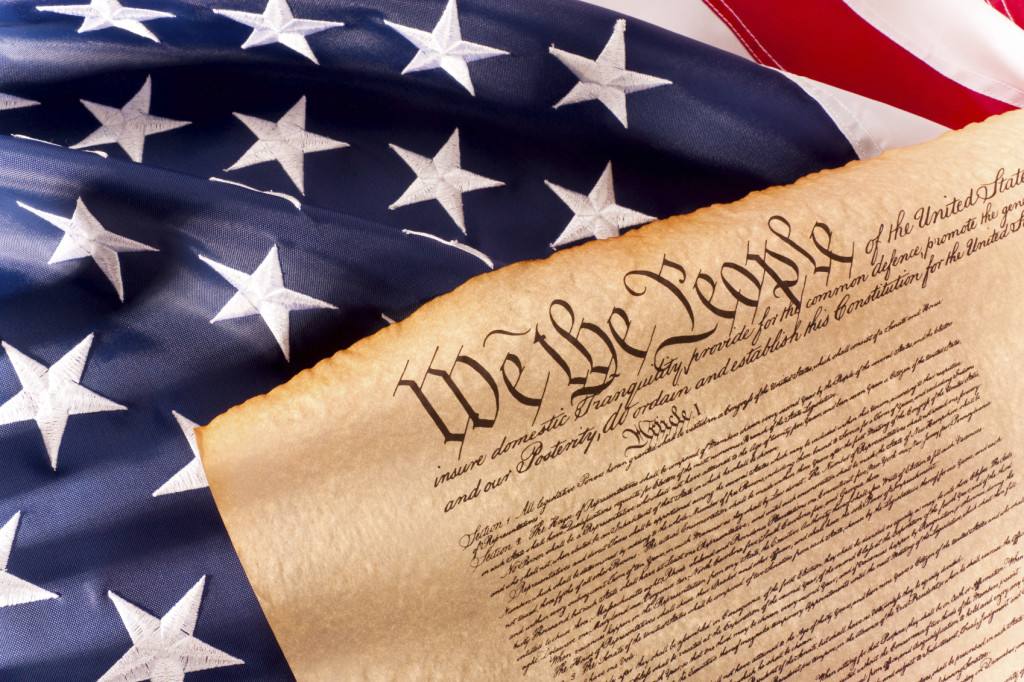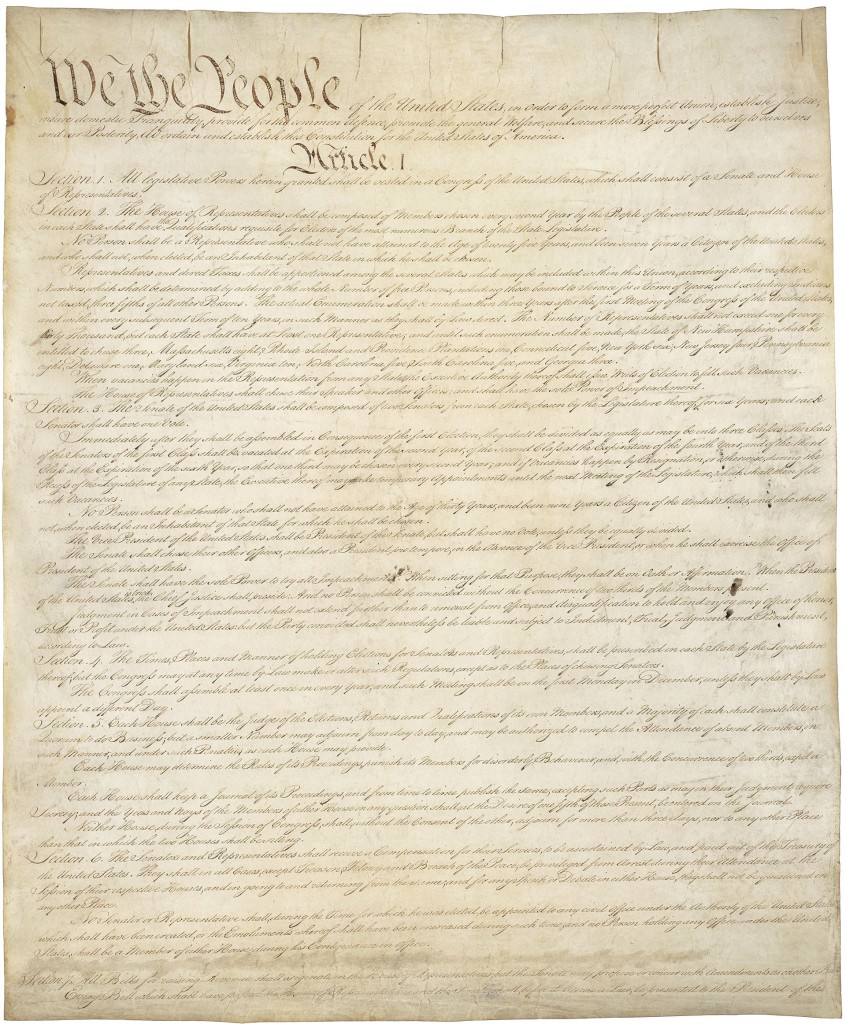Test Yourself !
Please take out a piece of paper and number from 1 through 30. Then carefully read the following 30 statements. Some of them are correct expressions of facts about the Constitution of the United States. Others are not correct as they are stated. If you consider a statement to be correct, mark a “T” for True on your separate piece of paper. If the statement in not correct, mark it “F” for False. If you do not know, chances are your own good judgement will result in a correct guess. Good Luck!
The Score Key
All 30 Correct, In under 3 Min. = A Proud American, A Constitutionalist at Heart!
27 to 29 Correct, In under 5 Min. = A Respectable Patriot!
24 t0 26 Correct, In under 7 Min. = A Statesman.
23 to 25 Correct = In under 10 Min. = A Countryman.
__________________________________________________________________________________________________________________________________________________
Ready, Set, Go !
1. The Constitution was established by the authority of the 13 original States?
2. The establishment of Justice is one of the expressed purpose of the Constitution?
3. Establishment of the police and military force is implied in the Preamble?
4. Religious Freedom is one of the purposes enumerated in the Preamble?
5. The Preamble definitely identifies the “Union” as the United States of America?
6. More perfect national unity is one of the objects expressly declared in the Preamble?
7. Promotion of the General Welfare is also mentioned?
8. The word, “Freedom” appears prominently in the Preamble?
9. The Preamble specifically states that this Constitution shall become the “Law of the Land” ?
10. Domestic tranquility is mentioned as one of the objects of the Constitution?
11. All persons born or naturalized in the United States and subject to it’s jurisdiction are Citizens
of the United States and of the state wherein they reside?
12. Private property may be taken for public use, when circumstances demand, without compensation
compensation to the owner?
13. Under a certain definite condition, involuntary servitude may still exist in the United States?
14. An official of the US government may, at his option, receive a title of nobility from a foreign
government?
15. The right of the citizens to vote cannot be abridged or denied on account of sex, race, color or
a previous condition of servitude?
16. No person may be punished for breaking a law established after the alleged offense occurred?
17. In a criminal case, a person may be required to be a witness against himself?
18. In civil suits, where the value of controversy exceeds $20 the defendant is entitled to the right of
a trial by jury?
19. The only grounds of “Treason” against the United States are waging war against it, or assisting
it’s enemies?
20. Powers not specifically dedicated to the states by the Constitution are reserved to the Federal Government to be delegated as Congress may see fit?
21. The Supreme Law of the land consists of the Constitutional laws of the United States that conform
to the Constitution, and the treaties made under the authority of the United States government?
22. Members of the state legislatures and all executive and judicial officers of each state are required to take an oath to support the Constitution of the United States?
23. It is possible for a person who has been guilty of treason to serve as a member of Congress?
24. The transportation and importation of liquor into any state who’s laws prohibit it is an offense
against the U.S. ?
25. In order for one state to enter into any agreement or compact with another state, it is necessary to gain content of Congress?
26. Application by the legislatures of three-fourths of the States is necessary to propose an Amendment to the Constitution?
27. The Constitution makes it mandatory for Governors of the various states to fill vacancies in the House and Senate by appointment, pending the election of a new Senator or Representative?
28. The electoral vote of any State for the election of President and Vice-President is equal to the total number of Senators and Representatives to which that State is entitled?
29. Under certain conditions, the Militia of a State might legally engage in War without declaration of
war by Congress, or orders from the President?
30. No tax or duty shall be laid on articles exported from any state?
Finish, Stop Your Clock!
Thank you for taking Isabela’s U.S. Constitution quiz! If you have a U.S. political background you most likely have Constitutional knowledge and have done well. The finish time in the score key next to the correct answers is just a personal gauge for your sharpness. If you have never read the Constitution and have done well, then congratulate yourself! Remember there is no pass or fail, just a continuing education to help you become a better U.S. Citizen which in itself promotes patriotism and good national will.
Answer Key
1) False : The Constitution was established by the authority of the People of the United States… who do ordain and establish this Constitution for the United States of America.”
2) True : The establishment of Justice is one of the expressed Purpose of the Constitution.
3) True : Establishment of the police and military force is implied in the Preamble.
4) False : Religious Freedom is enumerated in the First Amendment, not the Preamble.
5) True : The Preamble definitely identifies the Union as the United States of America.
6) True : More perfect national unity is one of the objects expressly declared in the Preamble.
7) True : Promotion of General Welfare is also mentioned.
8) False : The word “Freedom” does not appear prominently in the Preamble or the Constitution itself. It was the underlying principle throughout the whole document and what it represents, but by the word itself it is implied, not specified!
9) False : The Preamble does not specifically state that the Constitution will become the “Law of the Land.” What is specifically stated, in Article VII of the Constitution, is that neither the Constitution itself or any Amendments to it can become the law of the land until 3/4 of the states ratify it through their own Constitutional conventions.
10) True : Domestic tranquility is mentioned as one of the subjects of the Constitution.
11) True : All persons born or naturalized in the United States and subject to it’s jurisdiction are Citizens of the United States and of the State wherein they reside.
12) False : Private property may not be taken for public use when circumstances may demand, without compensation to the owner. Today, we tend to think of the 5th Amendment only as protection against self discrimination. These Amendment actually defines the rights of a private citizen versus that of the government in a range of areas.
13) True : Under a certain specific condition, involuntary servitude may still exist in the United States! Surprised? That “Certain Specific Condition” is clearly defined as “Punishment for a crime where of the party shall have been duly convicted.” In other words, our Constitution makes a clear distinction between unjust servitude such as slavery and the right of the people to sentence a justly convicted criminal to a term in a prison.
14) False : An official of the U.S. Government may not receive a title of nobility from a foreign government.
15) True : The right of citizens to vote cannot be abridged or denied on account of sex, race, color, or previous conditions of servitude.
16) True : No person may be punished for breaking a law established after the alleged offense occurs.
17) False : In a criminal case, a person cannot be required to be a witness against himself.
18) True : In civil suits where the value controversy exceeds $20.00, the defendant is entitled to the right of trial by jury.
19) True : The only grounds of Treason against the US are waging war against it or assisting it’s enemies. This is specifically to protect the rights of it’s citizens to speak in opposition against the government without the fear of being arrested for alleged treason.
20: False : Powers not specifically delegated to the States by the constitution “Are not reserved for the Federal Government” to be delegated as Congress may see fit. They are specifically left to the states. In other words, if the people have not ratified its inclusion in the Constitution, it does not belong to the Federal government by default.
21) True : The Supreme law of the land does consist of the Constitution, the laws of the United States that conform to the Constitution, and treaties made under the authority of the United States Government.
22) True : Members of state legislatures and all executive and judicial officers of each state are required to take an oat to support the Constitution of the United States.
23) True : It is possible for a person who has been guilty of treason to serve as a member of Congress! Surprised again? The only Constitutional defined requirements to serve Congress are age and years of US citizenship. Which are: 25 years old and 7 years a citizen to serve in the House of Representatives. Dirty years old and 9 years a citizen to serve in the Senate. This is not a legal loophole or an oversight by the framers of the Constitution. Quite the opposite! It is very consistent with the freedom given to us as a citizen to elect whomever the majority of us believe would represent us Best! Former Traitors included. This is because many of our Founding Fathers were convicted of Treason to the Crown, in absentia, during the American Revolution. Had this been a restriction, it would have raised an instant legal question should one of these men been elected to serve in the newly forming Congress.
24) True : The transportation or importation of liquor into any state who’s laws prohibit it is an offense against the United States. This is specified in the Amendment that repealed Prohibition. One of the principle purposes of the Constitution is to define the rights between the states of the union. In repealing Prohibition at a Federal level, this amendment affords Constitutional protection to the people to continue it within their own borders should they so choose.
25) True : In order for one state to enter into any agreement or compact with another state, it “is” necessary to gain consent from Congress.
26) False : Application by the legislatures of two-thirds, not three-fourths, of the states is necessary to propose an Amendment to the Constitution.
27) False : The Constitution does not make it mandatory for Governors of various states to fill vacancies in the House and Senate by appointment, pending the election of a new candidate. A governor may only due this if the laws of their state specifically empower them to do so.
28) True : The electoral vote for any state for the election of President and Vice-President is equal to the total number of Senators and Representatives to which that state is entitled.
29) True : Under certain conditions, the Militia of any state may legally engage in any war without a declaration of war by Congress or order from the President. However, that condition is very specific and the right for an individual state militia to engage in warfare in that circumstance is quite obvious. It is only permitted if the state is invaded, in this case, in other then a time of Congressionally declared war.
30: True : No tax or duty shall be laid on articles exported from any state.


